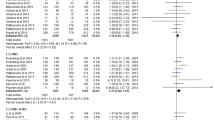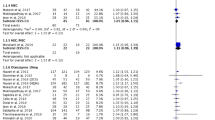Conclusion
In summary, the clinical application of the 5-HT3 antagonists presents new opportunities for the control of the nausea and vomiting associated with cytostatic therapy. If these agents are to be employed at optimal efficacy, both as single agents and in combination, adequately defined doses and schedules (from phase I–II studies) should be investigated in double-blind, randomized and appropriately stratified phase III trials. This is dictated particularly by the subjective nature of nausea and the multi-factorial etiology of nausea and vomiting. Efficacy should be judged according to agreed response criteria for which there is currently no consensus. Response criteria should be based on the patient's experience of both nausea and vomiting, if these are to adequately relate to the patients experience and improve their tolerance of emetogenic therapies. Finally, emphasis should be given to the results after the first 24 hr of acute control of examine the delayed phase, and to assess the results over several cycles of treatment. There is also a lack of data studying the control of anticipatory nausea and vomiting, and new, well designed studies using all the factors described above need to be constructed in these important settings.
Similar content being viewed by others
References
Bronchud MH, Howell A, Crowther D, Hopwood P, Souza L, Dexter TM: The use of granulocyte colony-stimulating factor to increase the intensity of treatment with doxorubicin in patients with advanced breast and ovarian cancer. Br J Cancer 60(1):121–125, 1989
Sheridan WP, Morstyn G, Wolf M, Dodds A, Lusk J, Maher D, Layton JE, Green MD, Souza L, Fox RM: Granulocyte colony-stimulating factor and neutrophil recovery after high-dose chemotherapy and autologous bone marrow transplantation. Lancet 2:891–895, 1989
Edmonson JH, Long HJ, Jeffers JA, Buckner JC, Colon-Otero G, Fitch TR: Amelioration of chemotherapy-induced thrombocytopenia by GM-CSF: apparent dose and schedule dependency. J Nat Cancer Inst 81:1510–1511, 1989
Aapro MA: Controlling emesis related to cancer therapy. Eur J Cancer 27:356–361, 1991
Kaye SB: How should nausea be assessed in patients receiving chemotherapy. Cancer Treat Rev 18(2):85–93, 1991
Grunberg SM: Making Chemotherapy easier. N Engl J Med 322:846–848, 1990
Olver IN, Simon RM, Aisner J: Antiemetic studies: a methodological discussion. Cancer Treat Rep 70:555–563, 1986
Gralla RJ, Hri LM, Pisko SE, Squillante AE, Kelsen DP, Braun DW Jr, Bordin LA, Braun TJ, Young CW: Antiemetic efficacy of high-dose metoclopramide: Randomised trials with placebo and prochlorperazine in patients with chemotherapy-induced nausea and vomiting. N Engl J Med 305:905, 1981
Aapro MA, Alberts DS: High-dose dexamethasone for prevention of cisplatin-induced vomiting. Cancer Chemother Pharmacol 7:11–14, 1981
Peters CA: Myths of antiemetic administration. Cancer Nurs 12:102–106, 1989
Richardson JL, Marks G, Levine A: The influence of symptoms of disease and side effects of treatment on compliance with cancer therapy. J Clin Oncol 6:1746–1752, 1988
Morrow GR: Susceptibility to motion sickness and the development of anticipatory nausea and vomiting in cancer patients undergoing chemotherapy. Cancer Treat Rep 68:1177–1178, 1984
Morrow GR, Morrell C: Behavioral treatment for the anticipatory nausea and vomiting induced by cancer chemotherapy. N Engl J Med 307:1476–1480, 1982
Tonato M, Roila F, Del Favero A: Methodology of antiemetic trials: A review. Ann Oncology 2:107–114, 1991
Geddes DM, Dones L, Hill E, Law K, Harper PG, Spiro SC, Tobias JS, Souhami RL: Quality of life during chemotherapy for small cell lung cancer: Assessment and use of a daily diary card in a randomized trial. Eur J Cancer 26:484–492, 1990
Smyth JF: The problem of emesis induced by cancer chemotherapy. Clinician 6:2–12, 1988
Bonneterre J, Hecquet B, Adenis A, Fournier C, Pion JM, Demaille A: How do patients and physicians decide which antiemetic is the best in cross over study? Proc Am Soc Oncol 10:323, 1991
Bennett JM, Byrne P, Desai A, White C, DeConti R, Vogel C, Krementz E, Muggia F, Doroshow J, Plotkin D: A randomized multicenter trial of cyclophosphamide, novantrone and 5-fluorouracil (CNF) versus cyclophosphamide, adriamycin and 5-fluorouracil (CAF) in patients with metastatic breast cancer. Invest New Drugs 3:179–185, 1985
Del Favero A, Roila F, Basurto C, Minotti V, Ballatori E, Tonato M, Tognoni G: Assessment of nausea. Eur Clin Pharmacol 38:115–120, 1990
Coates A, Abraham S, Kaye SB, Sowerbutts T, Frewin C, Fox RM, Tattersall MNH: On the receiving end — patient perception of the side effects of cancer chemotherapy. Eur J Cancer Clin Oncol 19:203–208, 1983
Morrow GR: The assessment of nausea and vomiting. Past problems, current issues and suggestions for future research. Cancer 53:2267–2278, 1984
Melzack R: Measurement of nausea. J Pain & Sympt Management 4:157–160, 1989
Holmes S, Eburn E: Patients' and nurses' perceptions of symptom distress in cancer. J Adv Nurs 14:840–846, 1989
Morrow GR: Autonomic changes resulting from chemotherapy induced nausea and vomiting in cancer patients. Proc Am Soc Clin Oncol 9:332, 1990
Heim ME, Queisser W: Antiemetic effect of the cannabinoid levonantradol hydrochloride in patients receiving cancer chemotherapy. Proceedings of the 13th International Cancer Congress, Seattle, Washington, 1982
Neidhart JA, Gagen M, Wilson HE, Young DC: Comparative trial of the antiemetic effects of THC and haloperidol. J Clin Pharmacol 21:38S-42S, 1981
Aapro MS, Froidevaux P, Roth A, Alberto P: Antiemetic efficacy of droperidol or metoclopramide combined with dexamethasone and diphenhydramine: a randomized open parallel study. Oncology 42:116–120, 1991
Aapro M, Kirchner V, Giger K, Haefliger JM, Terrey JP: Granisetron versus metoclopramide plus dexamethasone in patients receiving five day chemotherapy. Proc Am Soc Oncol 10:331, 1991
Aapro M, Plezia PM, Alberts DS, Graham V, Jones SE, Surwit EA, Moon TE: Double-blind crossover study of the antiemetic efficacy of high-dose dexamethasone versus highdose metoclopramide. J Clin Oncol 2:466–471, 1984
D'Acquisto RW, Tyson LB, Gralla RJ, Clark RA, Kris MG, von Witte DM, Cacavio A: The influence of a chronic high alcohol intake on chemotherapy-induced nausea and vomiting. Proc Am Soc Clin Oncol 5:257, 1986
Sullivan JR, Leyden MJ, Bell R: Decreased cisplatin-induced nausea and vomiting with chronic alcohol ingestion. N Engl J Med 309(13):796, 1983
Walsh TD: Antiemetic drug combinations in advanced cancer. Lancet i:1018, 1982
Roila F, Tonato M, Basurto C, Canaletti R, Morsia D, Passalacqua R, DiCostanzo F, Donati D, Colombo N, Ballatori E, Del Favero A, Tognoni G, Franzosi MG: Antiemetic activity of two different high doses of metoclopramide in cisplatin-treated cancer patients. A randomized double-blind trial of the Italian Oncology Group for Clinical Research. Cancer Treat Rep 69:1353–1357, 1985
Roila F, Tonato M, Basurto C, Bella M, Passalacqua R, Morsia D, DiCostanzo F, Donati D, Ballatori E, Tognoni G: Antiemetic activity of high doses of metoclopramide combined with methylprednisolone vs metoclopramide alone in cisplatin-treated cancer patients: a randomized double-blind trial of the Italian Oncology Group For Clinical Research. J Clin Oncol 5:141–149, 1987
Roila F, Tonato M, Basurto C, Picciafuoco M, Bracarda S, Donati D, Malacarne P, Monici L, DiCostanzo F, Patoia L, Ballatori E, Tognoni G, DelFavero A: Protection from nausea and vomiting in cisplatin-treated patients: high-dose metoclopramide combined with dexamethasone and diphenhydramine: a study of the Italian Oncology Group for Clinical Research. J Clin Oncol 7:1693–1700, 1989
Chevallier B on behalf of the Granisetron Study Group: Efficacy and safety of granisetron compared with high-dose metoclopramide plus dexamethasone in patients receiving high-dose ciplatin in a single-blind study. Eur J Cancer 26: S33–S36, 1990
Marty M on behalf of the Granisetron Study Group: A comparative study of the use of granisetron, a selective 5-HT3 antagonist, versus a standard anti-emetic regimen of chlorpromazine plus dexamethasone in the treatment of cytostatic-induced emesis. Eur J Cancer 26(Suppl 1):S28–S32, 1990
Smith IE on behalf of the Granisetron Study Group: A comparison of two dose levels of granisetron in patients receiving moderately emetogenic cytostatic chemotherapy. Eur J Cancer 26(Suppl 1):S19–S23, 1990
Soukop M on behalf of the Granisetron Study Group: A comparison of two dose levels of granisetron in patients receiving high-dose cisplatin. Eur J Cancer 26(Suppl 1): S15–S19, 1990
Jacobsen PB, Andrykowski MA, Redd WH, Die Trill M, Hakes TB, Kaufman RJ, Currie VE, Holland JC: Nonpharmacologic factors in the development of posttreatment nausea with adjuvant chemotherapy for breast cancer. Cancer 61:379–385, 1988
Martin M, Diaz-Rubin E: Emesis during past pregnancy: a new factor in chemotherapy-induced emesis. Ann Oncology 1:152–153, 1990
Nerenz DR, Leventhal H, Easterling DV, Love RR: Anxiety and drug taste as predictors of anticipatory nausea in cancer chemotherapy. J Clin Oncol 4:224–233, 1986
Priestman T: Radiation-induced emesis. Clinician 6:40–43, 1988
Stewart DJ: Cancer therapy, vomiting and antiemetics. Can J Physiol Pharmacol 68:304–313, 1990
Triozzi PL, Laszlo J: Recent advances in the control of nausea and vomiting. Primary Care 25–34, 1990
Carey MP, Burish TG, Brenner DE: Delta-9-tetrahydrocannabinol in cancer chemotherapy: research problems and issues. Ann Intern Med 99:106–114, 1983
Broadhead WE, Kaplan BH, James SA, Wagner EH, Schoenbach VJ, Grimson R, Heyden S, Tibblin G, Gehlbach SH: The epidemiologic evidence for a relationship between social support and health. Am J Epidemiol 117:521, 1983
Greer S, Morris T, Pettingale KW: Psychological responses to breast cancer: effect on outcome. Lancet ii:785–787, 1979
Pettingale KW, Morris T, Greer S, Haybitt le JL: Mental attitudes to cancer: an additional prognostic factor. Lancet i:750, 1985
Greer S: Psychological response to cancer and survival. Psychol Med 21:43–49, 1991
Ungerleider JT, Andryslak T, Fairbanks L, Goodnight J, Sarna G, Jannison K: Cannabis and cancer chemotherapy: a comparison of oral delta-9-THC and prochlorperazine. Cancer 50:636–645, 1982
Cupissol DR, Serrou B, Caubel M: The efficacy of granisetron as a prophylactic antiemetic and intervention agent in high-dose ciplatin-induced emesis. Eur J Cancer 26(Suppl 1):S23–S27, 1990
Hesketh PJ, Murphy WK, Lester EP, Gandara DR, Khojasteh A, Tapazoglou E, Sartiano GP, White DR, Werner K, Chubb JM: GR38032F (GR C507/75): a novel compound effective in the prevention of acute cisplatininduced emesis. J Clin Oncol 7:700–805, 1989
Einhorn LH, Nagy C, Werner K, Finn AL: Ondansetron: a new antiemetic for patients receiving cisplatin chemotherapy. J Clin Oncol 8:731–735, 1990
Kris MG, Gralla RJ, Clark RA, Tyson LB, Groshen S: Antiemetic control and prevention of side effects of anticancer therapy with lorazepam or diphenhydramide when used in combination with metoclopramide plus dexamethasone. A double-blind randomized trial. Cancer 50:2816–2228, 1987
Kris MG, Gralla RJ, Clark RA, Tyson LB: Phase II trials of the serotonin antagonist GR 38032F for the control of vomiting caused by cisplatin. J Natl Cancer Inst 81:42–46, 1989
Tyson LB, Gralla RJ, Kris MG, Young CW, Clark RA: Dose ranging antiemetic trial of high dose oral metoclopramide. Am J Clin Oncol (CCT) 12(3):239–243, 1989
Tabona MV: An overview of the use of granisetron in the treatment of emesis associated with cytostatic chemotherapy. Eur J Cancer 26(Suppl 1):S37–S41, 1990
Andrews PLR, Bhandari P, Davey P, Bingham S, Marr HE, Blower PR: Are all 5HT3 receptor antagonists the same? Eur J Cancer 29A(Suppl 1):S2–S6, 1992
Bruntsch U, Drechsler S, Miller E, Eiermann W, Tulusan AH, Buechner M, Hartenstein R, Koenig HJ, Gallmeier WM: Prevention of chemotherapy-induced nausea and emesis in patients who responded poorly to previous antiemetic therapy. (Abstr) Sixth European Conference on Clinical Oncology and Cancer Nursing (ECCO6), Satellite Symposium, Florence, October 1991
Joss RA, Brand BC, Buser KS, Cerny T: The Symptomatic control of cytostatic drug-induced emesis. A recent history and review. Eur J Cancer, 26(Suppl 1):S2–S8, 1990.
Author information
Authors and Affiliations
Rights and permissions
About this article
Cite this article
Aapro, M. Methodological issues in antiemetic studies. Invest New Drugs 11, 243–253 (1993). https://doi.org/10.1007/BF00874423
Issue Date:
DOI: https://doi.org/10.1007/BF00874423




